
Salvador is a 1986 American war drama film co-written and directed by Oliver Stone. It stars James Woods as Richard Boyle, alongside Jim Belushi, Michael Murphy and Elpidia Carrillo, with John Savage and Cynthia Gibb in supporting roles. Stone co-wrote the screenplay with Boyle.

Valerie Ritchie Perrine is an American retired actress. For her role as Honey Bruce in the 1974 film Lenny, she won the BAFTA Award for Most Promising Newcomer to Leading Film Roles, the Cannes Film Festival Award for Best Actress, and was nominated for the Academy Award for Best Actress. Her other film appearances include Superman (1978), The Electric Horseman (1979), and Superman II (1980).

Elpidia Carrillo is a Mexican actress and director. Her career includes roles in both film and television. Internationally is best known for supporting roles in the Predator, Bread and Roses,Nine Lives and Blue Beetle.

The Two Jakes is a 1990 American neo-noir mystery film and the sequel to the 1974 film Chinatown. Directed by and starring Jack Nicholson, who reprises his role of J.J. “Jake” Gittes from the first film, the cast also features Harvey Keitel, Meg Tilly, Madeleine Stowe, Richard Farnsworth, Frederic Forrest, David Keith, Rubén Blades, Tracey Walter and Eli Wallach. Also reprising their roles from Chinatown are Joe Mantell, Perry Lopez, James Hong, and, in a brief voice-over, Faye Dunaway. The musical score for the film is by Van Dyke Parks, who also appears as a prosecuting attorney.
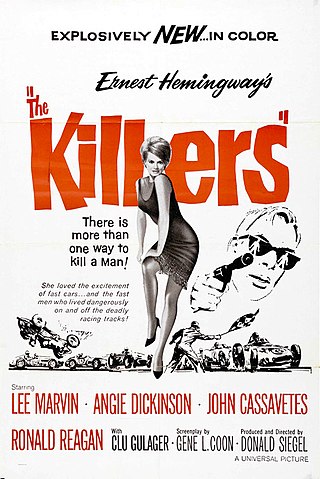
The Killers is a 1964 American neo noir crime film. Written by Gene L. Coon and directed by Don Siegel, it is the second Hollywood adaptation of Ernest Hemingway's 1927 short story of the same name, following the 1946 version.

Mother, Jugs & Speed is a 1976 American black comedy film directed by Peter Yates. It stars Bill Cosby (Mother), Raquel Welch (Jugs), Harvey Keitel (Speed), and Larry Hagman as employees of an independent ambulance service trying to survive in Los Angeles.
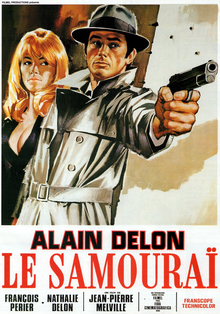
Le Samouraï, is a 1967 neo-noir crime thriller film written and directed by Jean-Pierre Melville and starring Alain Delon, François Périer, Nathalie Delon, and Cathy Rosier. A Franco-Italian production, it depicts the intersecting paths of a professional hitman (Delon) trying to find out who hired him for a job and then tried to have him killed, and the Parisian commissaire (Périer) trying to catch him.

Blood and Wine is a 1996 American neo-noir crime thriller film directed by Bob Rafelson and starring Jack Nicholson, Stephen Dorff, Jennifer Lopez, Judy Davis, and Michael Caine. The screenplay was written by Nick Villiers and Alison Cross. Rafelson has stated that the film forms the final part of his unofficial trilogy with Nicholson, with whom he made Five Easy Pieces and The King of Marvin Gardens in the 1970s.

The Shooting is a 1966 American Western film directed by Monte Hellman, with a screenplay by Carole Eastman. It stars Warren Oates, Millie Perkins, Will Hutchins, and Jack Nicholson, and was produced by Nicholson and Hellman. The story is about two men who are hired by a mysterious woman to accompany her to a town located many miles across the desert. During their journey, they are closely tracked by a black-clad gunslinger, who seems intent on killing all of them.

Blue Collar is a 1978 American crime drama film directed by Paul Schrader in his directorial debut. Written by Schrader and his brother Leonard, the film stars Richard Pryor, Harvey Keitel and Yaphet Kotto. The film is both a critique of union practices and an examination of life in a working-class Rust Belt enclave.
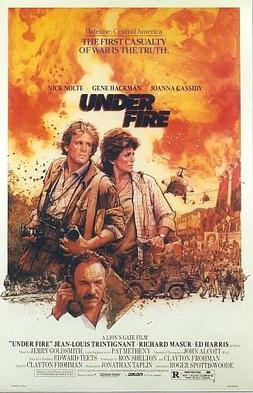
Under Fire is a 1983 American political thriller film set during the last days of the Nicaraguan Revolution that ended the Somoza regime in 1979. Directed by Roger Spottiswoode, it stars Nick Nolte, Gene Hackman and Joanna Cassidy. The musical score by Jerry Goldsmith, which featured jazz guitarist Pat Metheny, was nominated for an Oscar for Best Original Score. The editing by Mark Conte and John Bloom was nominated for a BAFTA Award for Best Editing. The film was shot in the Mexican states of Chiapas and Oaxaca.
Janet R. Maslin is an American journalist, best known as a film and literary critic for The New York Times. She served as a Times film critic from 1977 to 1999 and as a book critic from 2000 to 2015. In 2000, Maslin helped found the Jacob Burns Film Center in Pleasantville, New York. She is president of its board of directors.

Nine Lives is a 2005 American drama film written and directed by Rodrigo García. The screenplay, an example of hyperlink cinema, relates nine short, loosely intertwined tales with nine different women at their cores. Their themes include parent-child relationships, fractured love, adultery, illness, and death. Similar to García's previous work, Things You Can Tell Just by Looking at Her, it is a series of overlapping vignettes, each one running about the same length and told in a single, unbroken take, featuring an ensemble cast.
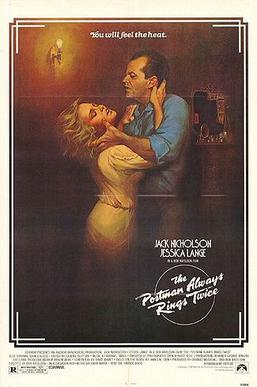
The Postman Always Rings Twice is a 1981 American neo-noir erotic thriller film directed by Bob Rafelson and written by David Mamet. Starring Jack Nicholson and Jessica Lange, it is the fourth adaptation of the 1934 novel by James M. Cain. The film was shot in Santa Barbara, California.

Bread and Roses is a 2000 film directed by Ken Loach, starring Pilar Padilla, Adrien Brody and Elpidia Carrillo. The plot deals with the struggle of poorly paid janitorial workers in Los Angeles and their fight for better working conditions and the right to unionize. It is based on the "Justice for Janitors" campaign of the Service Employees International Union (SEIU), and the lead union organizer, Sam Shapiro, is based on SEIU organizer Jono Shaffer.

Tortilla Soup is a 2001 American comedy-drama film directed by María Ripoll. The screenplay by Tom Musca, Ramón Menéndez and Vera Blasi is based on the film Eat Drink Man Woman, which was written by Hui-Ling Wang, Ang Lee, and James Schamus.

Mrs. Soffel is a 1984 American drama film directed by Gillian Armstrong, starring Diane Keaton and Mel Gibson and based on the story of condemned brothers Jack and Ed Biddle, who escaped prison with the aid of Kate Soffel, the warden's wife.
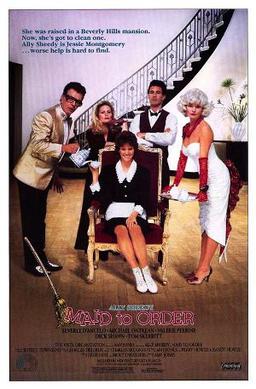
Maid to Order is a 1987 American comedy/fantasy film. It is a variation on the Cinderella formula, where the fairy godmother is not the means to a better life for the heroine, but rather the nemesis. Rather than doing so out of malice, though, the fairy godmother hopes to teach the heroine that life has more of importance than financial security.

Monkey Trouble is a 1994 American comedy drama film directed by Franco Amurri and starring Thora Birch and Harvey Keitel. Amurri dedicated the film to his daughter Eva and named the film's protagonist after her.
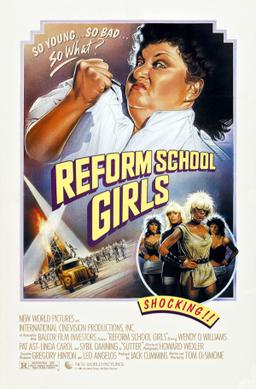
Reform School Girls is a 1986 American prison black comedy film, written and directed by Tom DeSimone. It stars Linda Carol, Wendy O. Williams, Pat Ast, Sybil Danning and Sherri Stoner, and depicts the story of a young girl who is sent to a reform school for girls that is operated by a sadistic and evil warden. She also has to deal with the local bully (Williams).



















